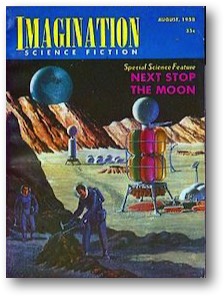866-295-4143, fbns@wayoflife.org

Take CARL SAGAN (1934-1996), for example, whose best-selling sci-fi novel Contact was made into a movie. Sagan was one of the high priests of atheistic evolution. In his novel he has the main character debating two preachers and saying, “There is no compelling evidence that God exists.” Not long before he died, Sagan said, “I share the view of a hero of mine, Albert Einstein: ‘I cannot conceive of a god who rewards and punishes his creatures or has a will of the kind that we experience in ourselves.’ Neither can I--nor would I want to--conceive of an individual that survives his physical death. Let feeble souls, from fear or absurd egotism, cherish such thoughts’” (Parade, March 10, 1996).
Consider another prominent name in Sci-Fi, ISAAC ASIMOV (1920-1992). In a 1982 interview he said, “Emotionally, I am an atheist. I don’t have the evidence to prove that God doesn’t exist, but I so strongly suspect he doesn’t that I don’t want to waste my time” (Paul Kurtz, “An Interview with Isaac Asimov on Science and the Bible,” Free Inquiry, Spring 1982, p. 9).
Consider ROBERT HEINLEIN (1907-1988), called “the dean of science fiction writers.” He rejected the Bible and promoted “free sex.” His book “Stranger in a Strange Land” is considered “the unofficial bible of the hippie movement.” Heinlein was a nudist and practiced “polyamory.” He promoted agnosticism in his sci-fi books.
Consider ARTHUR CLARKE (1917-2008), author of many sci-fi works, including 2001: A Space Odyssey. Clarke promoted evolutionary pantheism. He told a Sri Lankan newspaper, “I don’t believe in God or an afterlife” (“Life Beyond 2001: Exclusive Interview with Arthur C. Clarke,” The Island, Dec. 20, 2000). In the instructions he left for his funeral in March 2008 he said, “Absolutely no religious rites of any kind, relating to any religious faith, should be associated with my funeral.”
Consider KURT VONNEGUT (1922-2007). He was an atheist, and as an honorary president of the American Humanist Association he subscribed to its code which “does not accept supernatural views of reality.”
Consider GENE RODDENBERRY (1921-1991), creator of Star Trek. He was an agnostic and humanist who envisioned a world in which “everyone is an atheist and better for it” (Brannon Braga, “Every Religion Has a Mythology,” International Atheist Conference, June 24, 2006).
Consider H. G. WELLS (1866-1946), author of such science fiction classics as The Time Machine, War of the Worlds, and The First Man on the Moon. He converted to Darwinism as a college student under the influence of Thomas Huxley (“Darwin’s Bulldog”) and spent the rest of his life preaching atheism and an extreme form of eugenics. Wells’ illegitimate son, Anthony West, said that after studying under Huxley, “Darwinian evolution inspired Wells’ writings forever after.” In The Outline of History, Wells described man’s supposed rise from the apes, describing Neanderthal as “stooped forward and could not hold his head erect, as all living men do; he was chinless and perhaps incapable of speech ... he was, indeed, not quite of the human species.” This was as mythical as his science fiction writings. Wells embraced the modern culture of death, advocating sterilization, abortion, infanticide, suicide, and euthanasia for the “inferior,” meaning the diseased, the deformed, the mentally ill, alcoholics, criminals, even the “helpless.” Not only was he in favor of killing individuals that he considered inferior but entire races, as well. He said, “... there is only one sane and logical thing to be done with a really inferior race and that is to exterminate it” (Diane Paul, Controlling Human Heredity, 1995, p. 75). He said “those swarms of blacks, and brown, and dirty-white, and yellow people ... will have to go” (Martin Gardner, Fads and Fallacies in the Name of Science, 1957, p. xi). Wells urged society to have “no pity and less benevolence” toward the inferior. He wanted to create a master race through Darwinian survival of the fittest. He wasn’t without a conscience, though. He advocated administering opiates to those who were to be killed! In his later years he backed away from killing the unfit, but he continued to call for their sterilization. Wells called the God of the Bible “absurd.” Not surprisingly, he was an early advocate of “free love” and lived a debauched moral life. He was a serial adulterer, even committing adultery with the daughters of his friends. One of his partners in adultery was fellow atheist and eugenist Margaret Sanger, founder of Planned Parenthood. He died an “infinitely frustrated” and broken man, with no hope for the future, neither for himself nor for the human race.
Consider RAY BRADBURY (1920-2012), author of Fahrenheit 451 and the Martian Chronicles. Bradbury grew up in a Baptist home, but he describes himself as “delicatessen religionist.” He is particularly enamored with Buddhism and Eastern religion, even calling himself a “Zen Buddhist.” He is a pantheist and an evolutionist. He considers Jesus a wise prophet, like Buddha and Confucius, a man who became christ through self effort (“Sci-fi Legend Ray Bradbury on God,” CNN, August 2, 2010). He claims that when it comes to God, “none of us know anything.” He says that man must leave earth for salvation. “We must move into the universe. Mankind must save itself. We must escape the danger of war and politics. We must become astronauts and go out into the universe and discover the God in ourselves.”
Consider TERRY PRATCHETT (1948-2015) a science fiction/fantasy author who sold more than 85 million books worldwide in 37 languages. The top-selling UK author in 1996, he was best known for the Discword series. Though his influence was large, he was an atheist. He described himself as a humanist and was a Distinguished Supporter of the British Humanist Association. In his youth he was addicted to reading science fiction and attending science fiction conventions. His favorite authors included H.G. Wells. Pratchett was a proponent of euthanasia, and in 2011 he presented a BBC television documentary Terry Pratchett: Choosing to Die. Three years later, he died at age 66, possibly by assisted suicide. A couple of years earlier, he said that he had come to believe that “on the other side of physics, there just may be the ordered structure from which everything flows” (Rob Davies, “Terry Pratchett hints he may have found God,” Daily Telegraph, June 8, 2008). He was quick to say, “This is not about God, but somewhere around there is where gods come from” (Front Row, BBC Radio 4, September 1, 2008).
Consider THOMAS DISCH (1940-2008), author of The Genocides, Camp Concentration, 334, and On Wings of Song. His last book was The Word of God, in which he pretended to speak from God’s perspective “to score points on the absurdity of hell and similar numinous postulates.” He blasphemously said, “One of the wonderful things about being God is you can say such nonsense and it’s all true” (The New York Sun, Jul. 8, 2008, Obituaries, p. 6). He knows better now, having committed suicide a few days after the publication of The Word of God.
Other science fiction writers and promoters who are atheists include Forrest Ackerman (1916-2008), Douglas Adams (1952-2001), James Aaron (b. 1973), J.G. Ballard (1930-2009), Ian Banks (1954-2013), Gregory Benford (b. 1941), John W. Campbell (1910-1971), Angela Carter (1940-1992), Edmund Cooper (1926-1982), Greg Egan (b. 1961), Harlan Ellison (b. 1934), Tom Flynn (b. 1955), Harry Harrison (1925-2012), Ursula LeGuin (b. 1929), Stanislaw Lem (1921-2006), China Mieville (b. 1972), Larry Niven (b. 1938), Phillip Pullman (b. 1946), Robert Sawyer (b. 1960), Bruce Sterling (b. 1954), Sean Williams (b. 1967).
Sci-fi arose in the late 19th and early 20th century as a product of an evolutionary worldview that denies the Almighty Creator. In fact, Darwinian evolution is the pre-eminent science fiction.
The intimate association between evolutionary “science” and science fiction was highlighted when Nature magazine was awarded the European Science Fiction Society’s Best Publisher award in 2005 for the “Future” series of short science fiction articles that Henry Gee instigated in 1999. A collection of these was published in Futures from Nature in 2008.
- Receive these reports by email
- www.wayoflife.org
______________________
Sharing Policy: Much of our material is available for free, such as the hundreds of articles at the Way of Life web site. Other items we sell to help fund our expensive literature and foreign church planting ministries. Way of Life's content falls into two categories: sharable and non-sharable. Things that we encourage you to share include the audio sermons, O Timothy magazine, FBIS articles, and the free eVideos and free eBooks. You are welcome to make copies of these at your own expense and share them with friends and family. You may also post parts of reports and/or entire reports to websites, blogs, etc as long as you give proper credit (citation). A link to the original report is very much appreciated as the reports are frequently updated and/or expanded. Things we do not want copied and distributed are "Store" items like the Fundamental Baptist Digital Library, print editions of our books, electronic editions of the books that we sell, the videos that we sell, etc. The items have taken years to produce at enormous expense in time and money, and we use the income from sales to help fund the ministry. We trust that your Christian honesty will preserve the integrity of this policy. "For the scripture saith, Thou shalt not muzzle the ox that treadeth out the corn. And, The labourer is worthy of his reward" (1 Timothy 5:18). Questions? support@wayoflife.org
Goal:Distributed by Way of Life Literature Inc., the Fundamental Baptist Information Service is an e-mail posting for Bible-believing Christians. Established in 1974, Way of Life Literature is a fundamental Baptist preaching and publishing ministry based in Bethel Baptist Church, London, Ontario, of which Wilbert Unger is the founding Pastor. Brother Cloud lives in South Asia where he has been a church planting missionary since 1979. Our primary goal with the FBIS is to provide material to assist preachers in the edification and protection of the churches.
Offering: Offerings are welcome if you care to make one. If you have been helped and/or blessed by our material offerings can be mailed or made online with with Visa, Mastercard, Discover, or Paypal. For information see: www.wayoflife.org/about/makeanoffering.html.





